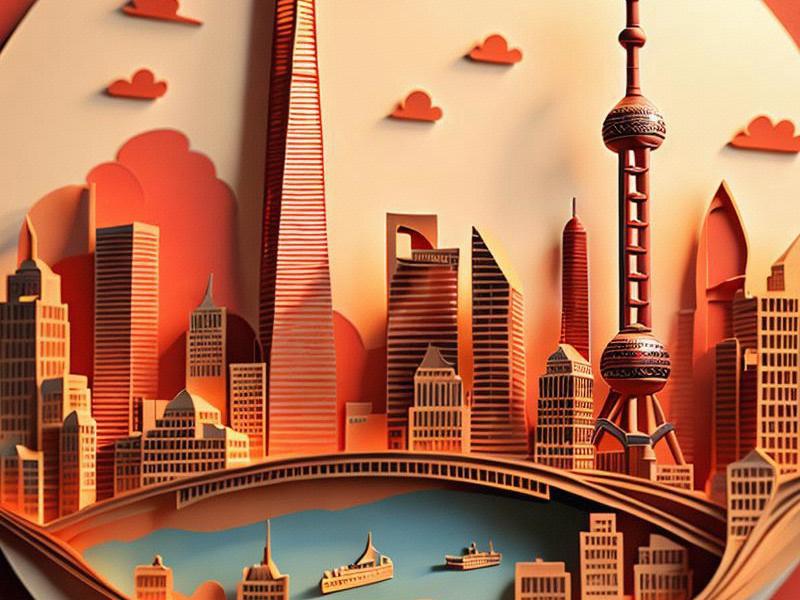Shanghai, a vibrant metropolis on the eastern coast of China, has long been a symbol of the country's rapid modernization and economic prowess. As one of the world's most dynamic cities, Shanghai is a melting pot of cultures, a global financial center, and a hub for innovation and creativity. This article delves into the multifaceted aspects of Shanghai, exploring its urban development, economic significance, cultural vibrancy, and the challenges and opportunities it faces in the 21st century.

Shanghai's history is a testament to its resilience and adaptability. Once a small fishing village, it grew into a major port city by the mid-19th century, thanks to its strategic location at the mouth of the Yangtze River. The city's transformation accelerated after the 1842 Treaty of Nanking, which opened it up to foreign trade and influence. Over the decades, Shanghai has undergone remarkable changes, from the bustling concessions of the early 20th century to the skyscrapers and modern infrastructure of today.
One of the most striking features of Shanghai is its urban landscape. The Bund, with its historic architecture and stunning views of the Pudong skyline, is a symbol of the city's rich history and rapid modernization. Across the Huangpu River, Pudong has emerged as a global financial district, home to the iconic Oriental Pearl Tower, the Jin Mao Tower, and the Shanghai Tower, the tallest building in China. The city's skyline is a constant reminder of Shanghai's ambition and drive to be a global leader.
Economically, Shanghai is a powerhouse. It is the largest city in China and one of the most important economic centers in the world. The city's GDP ranks among the highest globally, driven by a diverse range of industries, including finance, manufacturing, technology, and trade. Shanghai's free trade zone, established in 2013, has further solidified its position as a gateway for international commerce. The city attracts millions of tourists and business travelers each year, contributing significantly to its economy.
Culturally, Shanghai is a vibrant and diverse city. It is known for its blend of traditional Chinese culture and Western influences, which is reflected in its architecture, cuisine, and arts. The city's art scene is thriving, with galleries, theaters, and cultural festivals showcasing both local and international talent. Shanghai's museums, such as the Shanghai Museum and the Power Station of Art, offer a glimpse into the city's rich cultural heritage and contemporary art scene.
新夜上海论坛
The city's culinary scene is another highlight. Shanghai cuisine, known for its sweet and savory flavors, is a must-try for food lovers. From the famous xiaolongbao (soup dumplings) to the delicate shengjianbao (pan-fried buns), Shanghai's food culture reflects the city's history and diversity. The city's night markets and bustling street food stalls offer a taste of the local lifestyle and the flavors of China.
Shanghai's rapid development has not been without challenges. The city faces issues such as urban sprawl, environmental concerns, and social inequality. The high cost of living and housing has made it difficult for some residents to afford the lifestyle they desire. However, the city government has been proactive in addressing these challenges through urban planning, environmental initiatives, and social policies.
One of the key strategies for sustainable development in Shanghai is the promotion of green spaces and eco-friendly infrastructure. The city has invested in public transportation systems, including the metro and bus networks, to reduce traffic congestion and air pollution. Shanghai is also a leader in renewable energy and green building technologies, aiming to crteeaa more sustainable and livable city.
上海龙凤419官网
Innovation and technology are at the heart of Shanghai's future. The city is home to several high-tech zones and incubators, fostering a thriving startup ecosystem. Shanghai's talent pool, with its mix of local and international professionals, is a significant driver of innovation. The city's focus on research and development, coupled with its strategic location, makes it an attractive destination for global companies and entrepreneurs.
Education is another area where Shanghai excels. The city is home to world-renowned universities, such as Fudan University and Tongji University, which attract students from around the globe. Shanghai's education system is known for its quality and innovation, contributing to the city's reputation as a center of learning and research.
Shanghai's role in global affairs is also noteworthy. The city has been actively involved in international organizations and initiatives, promoting cooperation and dialogue on global issues. As a member of the World Expo's host city network, Shanghai has hosted major international events, showcasing its ability to organize and manage large-scale global gatherings.
上海私人外卖工作室联系方式
The future of Shanghai is bright, with opportunities for further growth and development. The city's vision for the future includes becoming a global leader in innovation, sustainability, and cultural exchange. Shanghai's commitment to these goals is evident in its urban planning, economic policies, and cultural initiatives.
However, the city must also address the challenges it faces, such as balancing economic growth with environmental sustainability and ensuring social equity. By doing so, Shanghai can continue to thrive as a dynamic metropolis and a model for urban development.
In conclusion, Shanghai is a city that embodies the spirit of modern China. Its rapid development, economic significance, cultural vibrancy, and commitment to sustainability make it a unique and dynamic metropolis. As Shanghai continues to grow and evolve, it remains a symbol of China's aspirations and a beacon of progress in the 21st century.